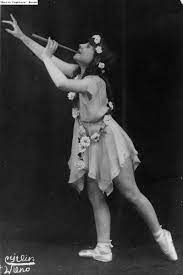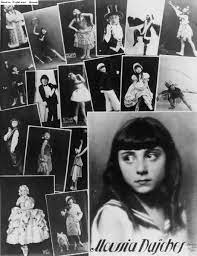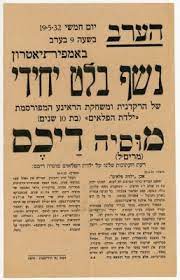Musia Dajches
 Musia (Miriam) Dajches (February 22, 1921 - July 27, 1980) was a Jewish dancer who became famous as a child prodigy in the late 1920s and the early 30s of the 20th century.
Musia (Miriam) Dajches (February 22, 1921 - July 27, 1980) was a Jewish dancer who became famous as a child prodigy in the late 1920s and the early 30s of the 20th century.
Biography
Childhood and performances as a child prodigy
Dajches and her twin brother were the youngest of five children born in Russia and whose family shortly afterwards moved to Vilna, then part of Poland. The family home served as a meeting place for Jewish musicians, actors and dancers, and thus her talent was discovered at a very young age. She began performing on stage in Vilna at the age of five, and soon became famous and performed throughout Poland. She created her own performances. The characters portrayed through the use of drama, mimicry, and a wide emotional range of expressions, made them memorable. She went to Paris at the age of seven, where she studied with the ballerina Olga Preobrajenska , and a year later accompanied her mother on a tour of Europe taking to the stage in Paris, London and Berlin and gaining wide publicity. In 1932, she came to Eretz Israel and performed in Tel Aviv and elsewhere in the country. Nahum Vardi, composer and pianist, accompanied her performances on the piano. Her performances aroused great excitement in the community and were an unforgettable experience. Bialik praised and congratulated her and carried her in his arms. Upon her return to Poland, the success continued. She appeared in two films, the Polish Przeznaczenie (Fate of Life) where she appeared in the role of a child and the Polish-French Calvaire d'Enfants.
World War II and the End of her Career
 At the age of fourteen, she stopped performing to finish high school, but the war broke out, and she never went back to dancing. During World War II, she was taken with her family to the Vilna Ghetto. All members of her family, including her husband, to whom she had been married only a few months, were murdered in the Holocaust. After the liquidation of the ghetto, Dajches was transferred to the Kaiserwald concentration camp near Riga, where she was sent to the AEG company's (Oberspree) women's labor camp. The Nazis, hearing about her past as a dancer, injured her legs so she could not dance again. The factory and all its workers were later transferred to Torun, Poland, where she witnessed the Russians' liberation of the camp. The file Women Warriors, edited by Rafi Livneh, contains testimonies and stories of about 20 women who were together in the same camps, including the testimonies of Musia Dajches and the poet Rivka Basman. Alongside descriptions of the difficult life, they lived; the stories of these women describe a life of friendship, sacrifice, mutual help and the insistence on preserving a spiritual and creative life. Among others, the stories narrate how Dajches set up a 'bread bank' to collect additional food ration from all the prisoners who could obtain it, and distribute it to the needy and weak so that they could survive.
At the age of fourteen, she stopped performing to finish high school, but the war broke out, and she never went back to dancing. During World War II, she was taken with her family to the Vilna Ghetto. All members of her family, including her husband, to whom she had been married only a few months, were murdered in the Holocaust. After the liquidation of the ghetto, Dajches was transferred to the Kaiserwald concentration camp near Riga, where she was sent to the AEG company's (Oberspree) women's labor camp. The Nazis, hearing about her past as a dancer, injured her legs so she could not dance again. The factory and all its workers were later transferred to Torun, Poland, where she witnessed the Russians' liberation of the camp. The file Women Warriors, edited by Rafi Livneh, contains testimonies and stories of about 20 women who were together in the same camps, including the testimonies of Musia Dajches and the poet Rivka Basman. Alongside descriptions of the difficult life, they lived; the stories of these women describe a life of friendship, sacrifice, mutual help and the insistence on preserving a spiritual and creative life. Among others, the stories narrate how Dajches set up a 'bread bank' to collect additional food ration from all the prisoners who could obtain it, and distribute it to the needy and weak so that they could survive.
After the War
 After the liberation of the camp by the Red Army, Dajches returned to Poland where she remarried. Immediately afterwards, the couple fled to Germany and arrived in Munich where their twins were born - a son and a daughter. They later imigrated to New Jersey in the United States where her husband Arnold ran a chicken farm. Starting in 1960, Dajches visited Israel several times and decided her place was in Israel. In 1970, her family made aliyah and settled in Tel Aviv. She integrated and became a prominent figure among Jews from Vilna and Yiddish cultural figures. She wrote poems in Yiddish that were translated into Hebrew by Shoshana Raczyńska and compiled in the book Sideways Wings, published after her death. Musia Dajches' daughter is Ruth Dajches, a drama teacher.
After the liberation of the camp by the Red Army, Dajches returned to Poland where she remarried. Immediately afterwards, the couple fled to Germany and arrived in Munich where their twins were born - a son and a daughter. They later imigrated to New Jersey in the United States where her husband Arnold ran a chicken farm. Starting in 1960, Dajches visited Israel several times and decided her place was in Israel. In 1970, her family made aliyah and settled in Tel Aviv. She integrated and became a prominent figure among Jews from Vilna and Yiddish cultural figures. She wrote poems in Yiddish that were translated into Hebrew by Shoshana Raczyńska and compiled in the book Sideways Wings, published after her death. Musia Dajches' daughter is Ruth Dajches, a drama teacher.
Commemoration
After her death, some of her friends set up the Musia Dajches Memorial Committee. In 1983, the Committee published a book in her memory, "Musia Miriam Dajches, February 22, 1921 - July 27, 1980." The book, in Hebrew, Yiddish and English, contains a short biography, photos and press clippings from her childhood performances, as well as articles and press interviews from her visits and her aliyah to Eretz Israel. It also contains memorial text, some of her poems, and many photographs. Among the writers are mentioned Avraham Broides, Ofra Burla Adar, Haim Gouri, Rivka Basman Leah Etgar, Younes Turkov, Alexander Yahalomi and Shoshana Raczyńska.
In 1990, the Inbal Dance Theatre performed a piece created by Sara Levy-Tanai in Dajches memory.
From: Wikipedia

